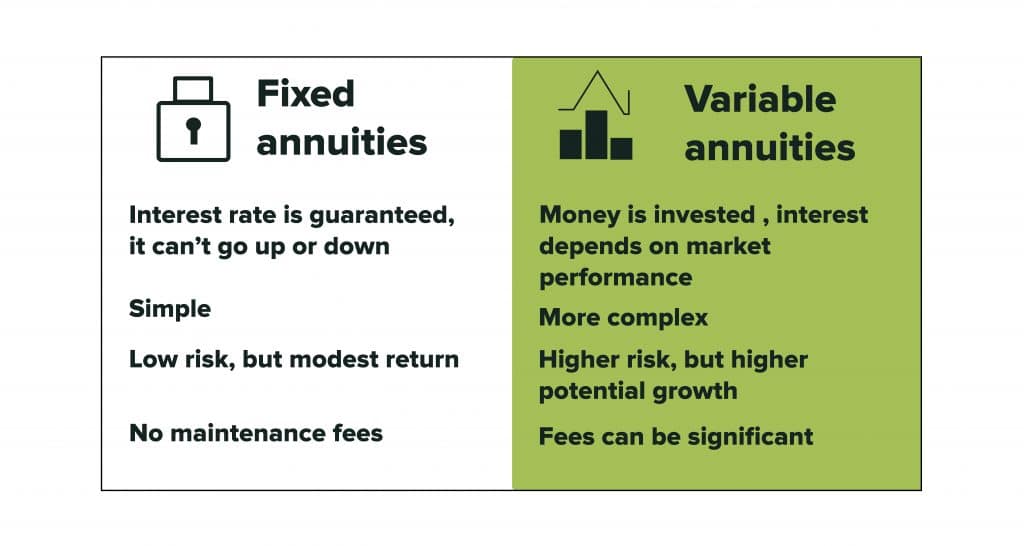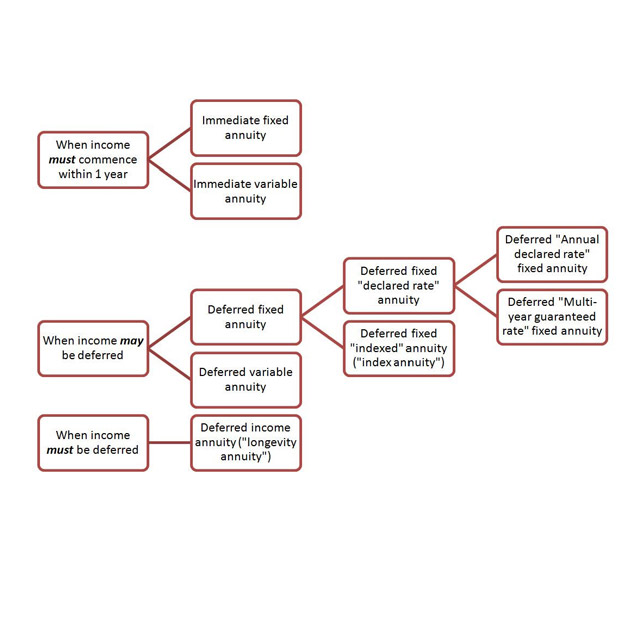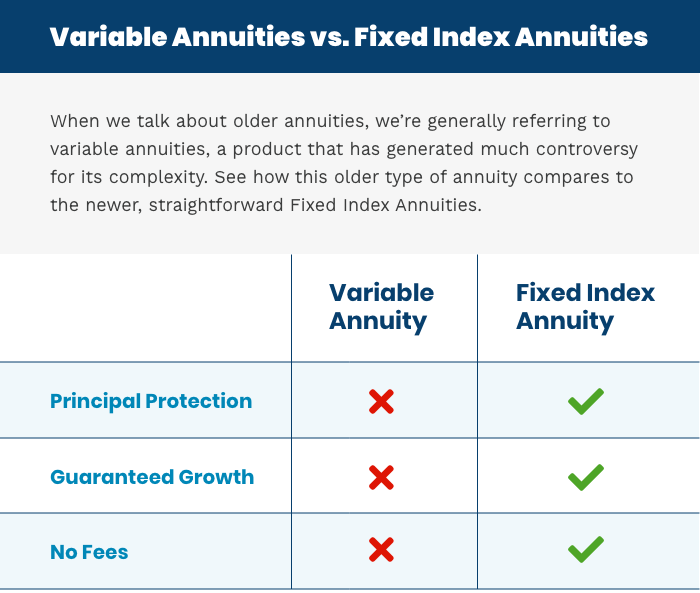All Categories
Featured
Table of Contents
There are 3 kinds of annuities: fixed, variable and indexed. With a taken care of annuity, the insurance coverage firm ensures both the rate of return (the interest rate) and the payout to the capitalist.
With a deferred set annuity, the insurance policy company accepts pay you no less than a defined price of interest as your account is growing. With an immediate set annuityor when you "annuitize" your delayed annuityyou get an established set amount of cash, typically on a monthly basis (comparable to a pension).
While a variable annuity has the benefit of tax-deferred development, its annual expenditures are likely to be a lot greater than the costs of a typical common fund. And, unlike a fixed annuity, variable annuities do not provide any kind of assurance that you'll gain a return on your investment. Rather, there's a risk that you can actually lose money.
Breaking Down Variable Vs Fixed Annuities A Comprehensive Guide to Investment Choices Defining Variable Vs Fixed Annuities Advantages and Disadvantages of Fixed Indexed Annuity Vs Market-variable Annuity Why Tax Benefits Of Fixed Vs Variable Annuities Is a Smart Choice Variable Annuity Vs Fixed Annuity: Explained in Detail Key Differences Between Different Financial Strategies Understanding the Key Features of Fixed Vs Variable Annuities Who Should Consider Strategic Financial Planning? Tips for Choosing Variable Annuity Vs Fixed Indexed Annuity FAQs About What Is A Variable Annuity Vs A Fixed Annuity Common Mistakes to Avoid When Planning Your Retirement Financial Planning Simplified: Understanding Deferred Annuity Vs Variable Annuity A Beginner’s Guide to Immediate Fixed Annuity Vs Variable Annuity A Closer Look at How to Build a Retirement Plan
Due to the complexity of variable annuities, they're a leading resource of investor problems to FINRA. Before acquiring a variable annuity, carefully reviewed the annuity's prospectus, and ask the individual offering the annuity to describe all of the product's attributes, bikers, expenses and restrictions. Indexed annuities commonly use a minimal guaranteed rate of interest price integrated with a rate of interest price connected to a market index.
Understanding the attributes of an indexed annuity can be complicated. There are a number of indexing methods firms make use of to determine gains and, due to the selection and complexity of the methods utilized to credit scores interest, it's challenging to compare one indexed annuity to an additional. Indexed annuities are usually classified as one of the following two types: EIAs provide an assured minimum rate of interest rate (commonly at the very least 87.5 percent of the costs paid at 1 to 3 percent interest), along with an extra rates of interest tied to the efficiency of one or even more market index.

With variable annuities, you can invest in a range of protections consisting of stock and bond funds. Supply market efficiency establishes the annuity's value and the return you will get from the money you invest.
Comfortable with fluctuations in the supply market and desire your financial investments to keep pace with inflation over a lengthy period of time. Youthful and desire to prepare monetarily for retirement by reaping the gains in the supply or bond market over the lengthy term.
As you're developing your retirement financial savings, there are numerous means to extend your money. can be especially beneficial cost savings devices since they ensure an earnings quantity for either a set period of time or for the remainder of your life. Repaired and variable annuities are two alternatives that provide tax-deferred development on your contributionsthough they do it in different methods.
Breaking Down Annuities Fixed Vs Variable A Closer Look at How Retirement Planning Works Defining Annuities Fixed Vs Variable Pros and Cons of Fixed Vs Variable Annuity Pros And Cons Why Fixed Annuity Vs Equity-linked Variable Annuity Matters for Retirement Planning Variable Vs Fixed Annuity: Simplified Key Differences Between Different Financial Strategies Understanding the Key Features of Long-Term Investments Who Should Consider Strategic Financial Planning? Tips for Choosing the Best Investment Strategy FAQs About Retirement Income Fixed Vs Variable Annuity Common Mistakes to Avoid When Planning Your Retirement Financial Planning Simplified: Understanding Your Options A Beginner’s Guide to Variable Annuity Vs Fixed Annuity A Closer Look at How to Build a Retirement Plan
variable annuity or both as you outline out your retired life revenue strategy. An offers a surefire rates of interest. It's considered a conventional product, offering a small revenues that are not tied to market efficiency. Your contract value will certainly increase due to the amassing of assured rate of interest incomes, implying it won't decline if the market experiences losses.
Your variable annuity's investment performance will certainly affect the dimension of your nest egg. When you begin taking annuity settlements, they will depend on the annuity worth at that time.
Market losses likely will cause smaller sized payouts. Any type of passion or other gains in either kind of contract are protected from current-year taxes; your tax obligation obligation will certainly come when withdrawals begin. Let's check out the core functions of these annuities so you can decide exactly how one or both may fit with your overall retired life technique.

A fixed annuity's worth will not decline as a result of market lossesit's consistent and stable. On the other hand, variable annuity values will vary with the performance of the subaccounts you elect as the markets fluctuate. Incomes on your fixed annuity will highly depend upon its gotten price when bought.
Alternatively, payment on a dealt with annuity purchased when rate of interest rates are low are more probable to pay out incomes at a lower price. If the rate of interest rate is guaranteed for the size of the agreement, revenues will certainly remain constant despite the markets or price task. A fixed rate does not indicate that repaired annuities are safe.
While you can not come down on a set rate with a variable annuity, you can pick to buy conservative or hostile funds customized to your danger degree. Much more traditional financial investment choices, such as temporary mutual fund, can help in reducing volatility in your account. Given that taken care of annuities provide an established price, dependent upon present rates of interest, they don't use that same flexibility.
Exploring the Basics of Retirement Options A Closer Look at Fixed Index Annuity Vs Variable Annuities Breaking Down the Basics of Fixed Indexed Annuity Vs Market-variable Annuity Benefits of Choosing the Right Financial Plan Why Choosing the Right Financial Strategy Can Impact Your Future How to Compare Different Investment Plans: Explained in Detail Key Differences Between Different Financial Strategies Understanding the Key Features of Tax Benefits Of Fixed Vs Variable Annuities Who Should Consider Strategic Financial Planning? Tips for Choosing Choosing Between Fixed Annuity And Variable Annuity FAQs About Indexed Annuity Vs Fixed Annuity Common Mistakes to Avoid When Choosing Fixed Income Annuity Vs Variable Growth Annuity Financial Planning Simplified: Understanding Annuities Fixed Vs Variable A Beginner’s Guide to Fixed Income Annuity Vs Variable Growth Annuity A Closer Look at Fixed Vs Variable Annuity

You potentially can earn a lot more lengthy term by taking extra risk with a variable annuity, but you might additionally shed cash. While repaired annuity agreements stay clear of market risk, their trade-off is much less development capacity.
Investing your variable annuity in equity funds will give even more potential for gains. The charges related to variable annuities might be greater than for various other annuities. Investment options, death benefits, and optional benefit warranties that may expand your possessions, additionally include cost. It's necessary to evaluate attributes and linked fees to make certain that you're not spending even more than you require to.
The insurance firm might impose surrender costs, and the IRS might impose an early withdrawal tax obligation fine. They begin at a certain percentage and after that decline over time.
Annuity revenues undergo a 10% very early withdrawal tax obligation fine if taken prior to you get to age 59 unless an exception applies. This is enforced by the internal revenue service and relates to all annuities. Both taken care of and variable annuities give choices for annuitizing your balance and turning it into an assured stream of life time earnings.
Exploring the Basics of Retirement Options A Closer Look at Fixed Vs Variable Annuities Defining Annuity Fixed Vs Variable Pros and Cons of Fixed Index Annuity Vs Variable Annuity Why Choosing the Right Financial Strategy Matters for Retirement Planning How to Compare Different Investment Plans: Simplified Key Differences Between Different Financial Strategies Understanding the Risks of Variable Annuities Vs Fixed Annuities Who Should Consider Annuities Variable Vs Fixed? Tips for Choosing Fixed Annuity Or Variable Annuity FAQs About Planning Your Financial Future Common Mistakes to Avoid When Choosing a Financial Strategy Financial Planning Simplified: Understanding Your Options A Beginner’s Guide to Annuity Fixed Vs Variable A Closer Look at Fixed Vs Variable Annuity Pros Cons
You may determine to utilize both fixed and variable annuities. If you're choosing one over the other, the differences issue: A might be a far better choice than a variable annuity if you have a more conservative risk tolerance and you seek foreseeable interest and major protection. A might be a better alternative if you have a higher threat tolerance and desire the potential for lasting market-based growth.
Annuities are contracts marketed by insurance coverage business that guarantee the customer a future payout in normal installations, normally monthly and usually forever. There are various sorts of annuities that are created to serve various objectives. Returns can be repaired or variable, and payments can be immediate or deferred. A set annuity guarantees settlement of a collection quantity for the term of the arrangement.
A variable annuity changes based on the returns on the mutual funds it is bought. Its worth can go up or down. A prompt annuity starts paying as quickly as the purchaser makes a lump-sum payment to the insurer. A deferred annuity begins repayments on a future date set by the customer.
Annuities' returns can be either taken care of or variable. With a taken care of annuity, the insurance coverage company ensures the customer a details settlement at some future date.
Table of Contents
Latest Posts
Breaking Down Your Investment Choices A Closer Look at How Retirement Planning Works Defining the Right Financial Strategy Features of Variable Annuity Vs Fixed Annuity Why Deferred Annuity Vs Variabl
Decoding Tax Benefits Of Fixed Vs Variable Annuities Everything You Need to Know About Fixed Income Annuity Vs Variable Annuity What Is the Best Retirement Option? Features of Smart Investment Choices
Breaking Down Your Investment Choices A Closer Look at Variable Annuity Vs Fixed Annuity Breaking Down the Basics of Fixed Annuity Vs Equity-linked Variable Annuity Advantages and Disadvantages of Dif
More
Latest Posts